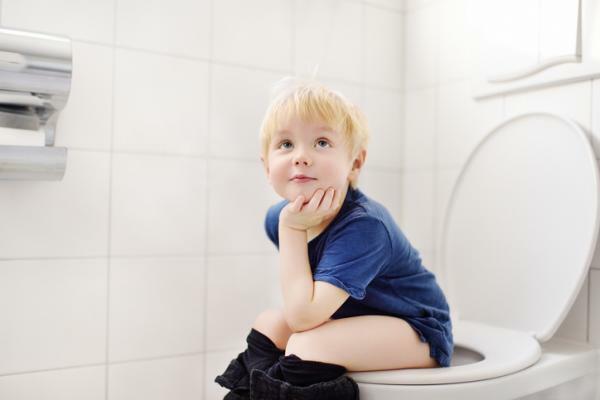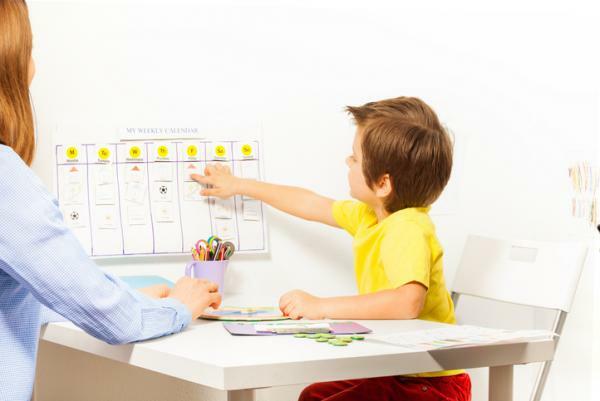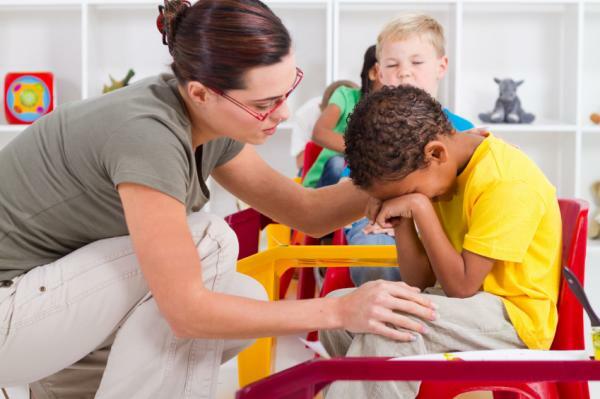
Is your child old enough to go to the bathroom but can't help but poop on himself? Does it affect the relationship with their colleagues and the performance of other activities? If so, your child may have encopresis. Encopresis occurs when a child over 4 years of age has the urge to defecate and does it over himself, staining his clothes. This problem is often associated with constipation. Constipation occurs when poop becomes "stuck" in the intestine. Treating constipation will help eliminate encopresis, although it will take a while. In this Psychology-Online article we explain the encopresis in children: causes and treatment.
Index
- Symptoms of infantile encopresis
- Possible causes of encopresis
- Helping a Child With Encopresis: Treatment
- Diagnosis of infantile encopresis
Symptoms of infantile encopresis.
The most common symptom of encopresis is staining the pants. Constipation usually occurs before encopresis, but it may not be detected. If your child doesn't go to the bathroom for 3 days or more and is in pain when he manages to poop, he may be constipated.
Other typical symptoms of encopresis can be:
- Loss of appetite
- Abdominal pain
- Urine infections
Your child can experience guilt or shame for staining the pants. Also, they can laugh at him at school for his problem. As a consequence of this, it is typical for children with encopresis to show behaviors to hide the problem, go unnoticed, be quiet, etc. For example, they can hide stained pants so that others do not find out what has happened.

Possible causes of encopresis.
Going to the bathroom can become a problem for your child if he does not eat a diet rich in fiber, if he does not drink a lot of water or does little exercise. Here are some reasons why going to the bathroom can be very painful.
If the stool is too liquid, your child may not be able to control it and stain his pants. In some cases, the intestine can be widened by the blockage of the stool causing your child to lose the feeling that he needs to go to the bathroom.
The most common causes of constipation that can cause encopresis are:
- Low fiber diet
- Lack of water
- Little physical exercise
- Learning to go to the bathroom ahead of time
- Go to the bathroom less than once every three days
Some psychological causes less common are:
- Behavioral problems, conduct disorders
- Family, school, environmental stressors, etc.
- Anxiety about toilet behavior
That encopresis is associated with psychological causes does not mean that the symptoms are under the control of the child. Most of them do not intentionally lose control of their stool for any purpose. The problem can start from controlled situations like fear of using the bathroom in places public or not wanting to learn to use the bathroom, but over time these situations end up being uncontrollable.
How to help a child with encopresis: treatment.
Some treatment options for encopresis are:
Remove the obstruction
Your doctor can recommend some clog removal product and relieve symptoms of constipation. These products may include:
- Mineral oil
- Enemas
- Laxatives
Changes in lifestyle
There are numerous lifestyle changes that can help your child overcome encopresis.
Adopt a high fiber diet it can improve or speed up the bowel rhythm. Some examples of foods rich in fiber are:
- Strawberries
- Cereals
- Jewish
- Grapes
- Broccoli
For children between 4 and 8 years old, drinking 5 glasses of water a day and prohibiting caffeine consumption can help prevent dehydration.
The Daily exercise helps intestinal mobilization. Encourage your child to exercise regularly.
Behavior modification
Behavioral techniques can be used to reinforce each time your child uses the bathroom correctly, eats high-fiber foods, and cooperates with treatment. Reinforcement can range from a compliment to tangible objects, as long as it is done consistently and consistently. Avoid scolding your son for staining his pants, as he can increase her anxiety when it comes to going to the bathroom. Instead of scolding him, try to remain neutral after every "accident."
Psychological therapy
If your child presents psychological stress or another type of underlying behavior problem, psychological therapy may be a good option. Therapy will help your child develop coping strategies and improve her self-esteem. Also, it can provide some behavioral guidelines for parents.

Diagnosis of infantile encopresis.
The diagnosis of encopresis is based primarily on the symptoms described by the patient and a physical examination. The Physical exam it can sometimes include an exam of the rectum.
A psychological test It can be done to detect the underlying emotional cause of the encopresis.
This article is merely informative, in Psychology-Online we do not have the power to make a diagnosis or recommend a treatment. We invite you to go to a psychologist to treat your particular case.
If you want to read more articles similar to Encopresis in children: causes and treatment, we recommend that you enter our category of Emotional and behavioral disorders.


